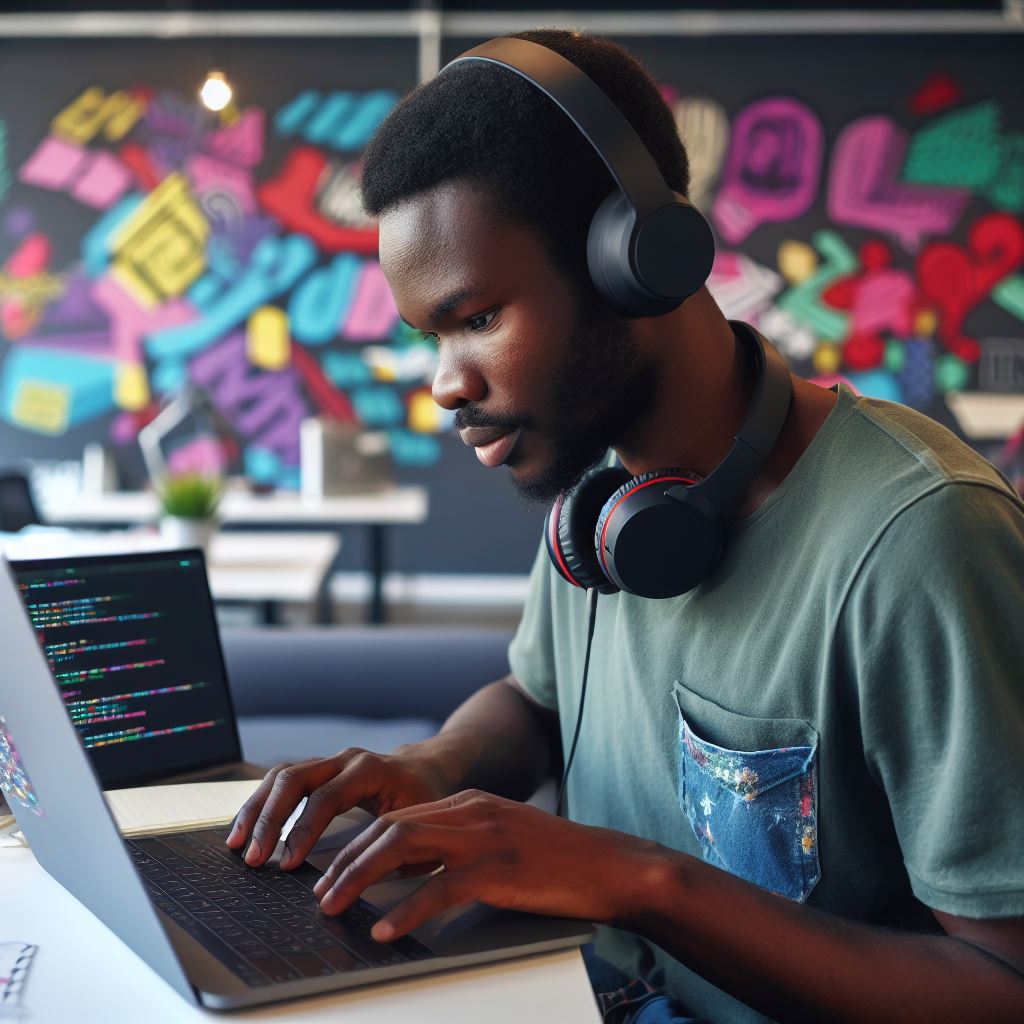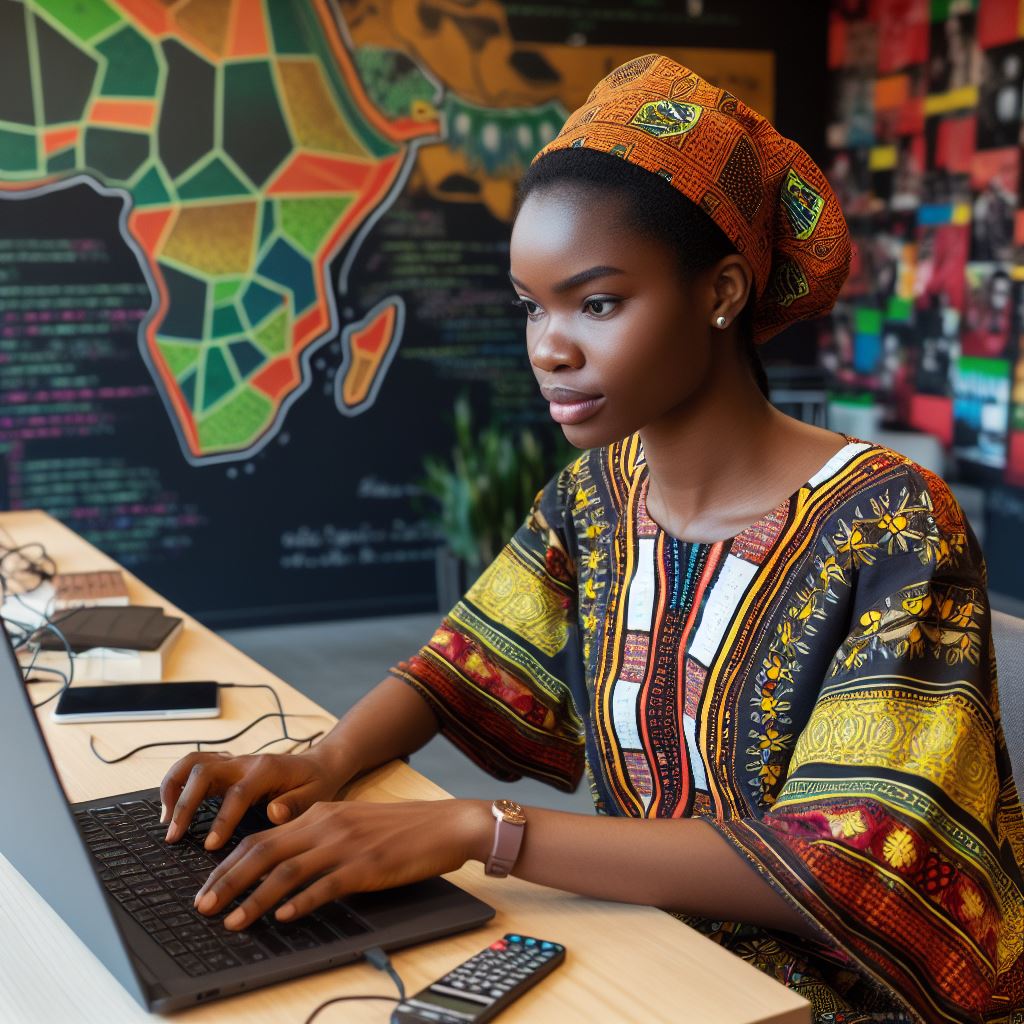Introduction
Women in coding in Nigeria are breaking barriers and making significant strides in the tech industry.
The importance of diversity and inclusion cannot be overstated when it comes to the advancement of technology.
In recent years, Nigeria has witnessed a remarkable increase in the number of women who are pursuing careers in coding.
These women have defied the odds and are leaving an indelible mark on the tech industry.
The tech industry has long been dominated by men, and there has been a lack of representation and inclusion for women. However, with the rise of women in coding in Nigeria, this is slowly changing.
The importance of diversity and inclusion in the tech industry cannot be stressed enough.
Different perspectives and experiences contribute to innovation and ensure that tech solutions cater to a wide range of users.
By breaking coding barriers, women in Nigeria are not only empowering themselves but also paving the way for future generations.
They serve as role models and inspire other women to join the field of technology.
Organizations and initiatives have emerged to support and encourage women in coding, providing training, mentorship, and networking opportunities.
These initiatives have played a pivotal role in creating a supportive ecosystem for women in the tech industry.
The increasing number of women in coding in Nigeria is a promising sign of progress.
The tech industry needs diversity and inclusion to thrive, and these women are leading the way in breaking barriers and creating a more inclusive tech landscape.
The Current State of Women in Coding in Nigeria
Women in Nigeria have been making significant strides in breaking coding barriers despite the underrepresentation they face in the field.
However, the gender gap in the tech industry persists, reflecting the cultural and societal challenges that women encounter when pursuing coding careers.
Underrepresentation of Women in the Coding Field
- Many women in Nigeria are still underrepresented in the coding field and face numerous obstacles.
- There is a clear lack of gender diversity in the tech industry, with women making up a small percentage of professionals.
- Women’s contributions and perspectives are often undervalued or overlooked in the coding industry.
Statistics and Data Highlighting the Gender Gap
- According to a recent report, only 17% of tech roles in Nigeria are held by women.
- The gender gap is even more apparent in leadership positions, with only 5% of executive roles being occupied by women.
- Furthermore, studies show a significant drop in female participation in computer science and coding courses at the university level.
Cultural and Societal Challenges for Women in Pursuing Coding Careers
- Traditional gender roles and stereotypes prevalent in Nigerian society discourage women from pursuing careers in coding.
- There is a lack of support and encouragement for girls and young women to pursue STEM fields from an early age.
- Women often face societal pressure to prioritize family and marriage over their professional aspirations.
- Sexism and discrimination persist in the workplace, creating a hostile environment for women entering the coding field.
- Many women lack access to resources, mentorship, and networking opportunities that could help them advance their coding careers.
Women in Nigeria continue to face significant barriers in breaking into the coding field.
The underrepresentation of women, coupled with the gender gap in the tech industry, highlights the need for more support, equal opportunities, and cultural change.
By addressing the cultural and societal challenges women face, promoting gender diversity, and providing inclusive work environments, Nigeria can tap into the immense potential of women in coding and drive innovation and progress forward.
Read: Top 5 Coding Schools for Beginners in Lagos, Nigeria
Women-led initiatives and organizations
Women-led initiatives and organizations have emerged in Nigeria to break coding barriers.
These initiatives and organizations provide coding education and support specifically for women.
Through these initiatives, women in Nigeria have been able to benefit and achieve success in coding.
Highlighting Women-led Coding Initiatives and Organizations
- She Code Africa: This organization focuses on training and mentoring women in coding skills.
- Girls Who Code Nigeria: This initiative aims to bridge the gender gap in technology by empowering young girls.
- TechHer Nigeria: TechHer offers coding workshops, mentorship programs, and networking opportunities.
- DevCareer: This platform provides training and job opportunities to women interested in coding.
- Andela: Andela is a technology company that trains and hires software developers, including women.
Providing Coding Education and Support
- These initiatives provide coding education to women who may not have access to traditional education.
- They create safe spaces for women to learn and grow in the coding field.
- Women-led initiatives offer coding workshops, boot camps, and online courses.
- They provide mentorship programs, connecting successful women coders with beginners.
- These organizations also organize coding events, conferences, and hackathons for women in Nigeria.
Success Stories from Women-led Initiatives
- Adaeze Okeke learned coding through She Code Africa’s training and now works as a software developer.
- Chisom Okoli joined TechHer’s mentorship program and started her own tech company.
- Patricia Abdul gained coding skills through Girls Who Code Nigeria and now works as a freelance developer.
- Elizabeth Ojo participated in Andela’s training and now contributes to open-source projects.
- Adebimpe Adesina attended DevCareer’s boot camp and secured a coding job in a top tech company.
These success stories demonstrate the impact of women-led coding initiatives in breaking barriers and empowering women in Nigeria.
By providing coding education, support, and showcasing successful examples, more women are encouraged to pursue coding as a career.
Unlock Your Unique Tech Path
Get expert tech consulting tailored just for you. Receive personalized advice and solutions within 1-3 business days.
Get StartedWomen-led coding initiatives are transforming the tech industry in Nigeria by ensuring equal opportunities for women.
Read: Exploring the Coding Ecosystem: Events in Nigeria 2024

Prominent women coders in Nigeria
- Oluwatoyin Aroyehun: Founder of Code Nigeria, an organization that promotes coding skills among women.
- Adaobi Frank: Co-founder of She Code Africa, a community that empowers women in tech through coding workshops.
- Abisoye Ajayi-Akinfolarin: Founder of GirlsCoding, a non-profit that trains young girls in coding and STEM subjects.
These women have made significant contributions to the coding field in Nigeria and have broken numerous barriers along the way.
Despite facing challenges, such as gender bias and societal expectations, they have persevered and achieved remarkable success.
Their experiences serve as an inspiration for other women who aspire to pursue careers in coding.
Oluwatoyin Aroyehun, through Code Nigeria, has been instrumental in providing coding education to women.
She has organized coding bootcamps, workshops, and mentorship programs, enabling women to develop their coding skills.
Adaobi Frank, as the co-founder of She Code Africa, has created a platform for women to network and collaborate.
The community offers coding workshops, webinars, and hackathons to empower women in tech.
Abisoye Ajayi-Akinfolarin’s GirlsCoding initiative has transformed the lives of many young girls in Nigeria.
Through after-school programs, these girls are introduced to coding and encouraged to pursue STEM careers.
These prominent women coders have not only made significant contributions, but they have also made a positive impact on the coding community.
They have helped break down barriers by showcasing that women can excel in coding and succeed in the tech industry.
By sharing their experiences and achievements, they inspire others to overcome challenges and pursue their passion for coding.
Unlock Premium Source Code for Your Projects!
Accelerate your development with our expert-crafted, reusable source code. Perfect for e-commerce, blogs, and portfolios. Study, modify, and build like a pro. Exclusive to Nigeria Coding Academy!
Get CodeRead: Getting Certified: Coding Exams for Beginners in Nigeria
Empowering women in coding
Empowering women in the field of coding is of utmost importance in today’s digital world.
By breaking the barriers that have traditionally kept women out of coding, we can unlock the hidden potential of countless talented individuals, fostering innovation and diversity in the industry.
The importance of empowering women in coding
- Bridging the gender gap: Empowering women in coding helps to address the significant gender gap present in the tech industry. By providing equal opportunities, we can create a more balanced and inclusive workforce.
- Encouraging diverse perspectives: When women are actively involved in coding and technological development, their unique perspectives and experiences contribute to a wider range of ideas and solutions. This benefits the industry as a whole.
- Economic empowerment: Coding skills are highly sought after in the job market, with numerous opportunities for career advancement and higher salaries. Empowering women in coding can lead to increased economic empowerment and financial independence.
- Inspiring future generations: When young girls see successful women in coding, they become inspired and believe that they too can pursue a career in this field. This cultivates a new generation of female coders and strengthens the pipeline of talent.
Mentorship programs, hackathons, and workshops
To empower women in coding, various initiatives have been established to provide mentorship, facilitate skill development, and create supportive networks. These initiatives include:
- Mentorship programs: Pairing aspiring female coders with experienced professionals can provide guidance, support, and valuable insights to navigate the industry.
- Hackathons: Organizing all-female hackathons not only provides a platform for women to showcase their skills but also fosters collaboration and networking among like-minded individuals.
- Workshops and coding bootcamps: Offering specialized workshops and coding bootcamps exclusively for women helps build their technical skills and confidence in a supportive and encouraging environment.
The impact of these initiatives on women’s career development and growth
- Increased representation: Empowering women in coding through mentorship programs, hackathons, and workshops has led to increased representation of women in the industry, promoting equality and gender diversity.
- Skill enhancement: These initiatives provide women with the opportunity to enhance their coding skills and stay up-to-date with the latest industry trends. This strengthens their competitiveness in the job market.
- Building confidence: By participating in supportive environments, women gain the confidence and self-belief necessary to pursue challenging roles and leadership positions within the coding industry.
- Networking and community building: Mentorship programs, hackathons, and workshops create opportunities for women to connect with industry professionals and peers, building valuable networks that can foster career growth and open doors to new opportunities.
- Breaking stereotypes: By showcasing successful women in coding, these initiatives challenge gender stereotypes and inspire others to pursue their passion for technology, regardless of societal expectations.
Empowering women in coding is not only crucial for achieving gender equality but also essential for driving innovation and progress in the tech industry.
Through mentorship, hackathons, and workshops, we can create a supportive ecosystem that enables women to thrive, ultimately benefiting individuals, the industry, and society as a whole.
Read: Freelancing in Coding: Tips for Nigerian Beginners
Overcoming challenges and creating a supportive environment
Addressing the challenges women face in the coding community and workplace
- Gender bias and stereotypes often discourage women from pursuing careers in coding.
- Women in the coding community often face isolation and lack of representation.
- In the workplace, women may encounter discrimination and unequal opportunities for growth.
- Work-life balance is a challenge for women in coding, especially for those with caregiving responsibilities.
Discussing strategies to create a more inclusive and supportive environment
- Education and awareness programs can challenge stereotypes and encourage women to pursue coding.
- Creating safe spaces and support networks can help women in the coding community to connect and thrive.
- Implementing mentorship programs can provide guidance and support for women in their coding careers.
- Removing unconscious biases in hiring and promotion processes can ensure gender equality in the workplace.
- Flexible work policies can support work-life balance for women in coding, promoting retention.
Highlighting the role of employers, educators, and policymakers in fostering gender diversity in coding
- Employers should actively work towards creating a diverse and inclusive workplace culture.
- Providing equal opportunities for training, career development, and leadership positions is crucial.
- Educators play a vital role in encouraging girls to pursue coding from an early age.
- Curriculum should be revised to include coding and computer science education for all.
- Policymakers need to promote initiatives that support gender diversity in the tech industry.
- Incentives for companies that prioritize diversity can encourage change at a larger scale.
Women in Nigeria face numerous challenges in the coding community and workplace.
However, by addressing these challenges and creating a more inclusive and supportive environment, we can overcome barriers and foster gender diversity in coding.
Employers, educators, and policymakers all play a crucial role in this endeavor, and by working together, we can create a brighter and more inclusive future for women in coding.
Conclusion
Women in Nigeria have made significant progress and achieved great feats in the coding field.
They have dismantled barriers and paved the way for more equality and inclusivity in the tech industry.
It is vital to recognize and continue supporting their efforts in breaking coding barriers for women.
By providing more opportunities, support, and recognition, we can further empower women in the tech industry and promote diversity and innovation.
As we conclude, let us encourage organizations and individuals to invest in initiatives that foster female participation in coding.
By doing so, we can create a more inclusive and balanced tech ecosystem in Nigeria, where the achievements of women in coding are celebrated and magnified.




